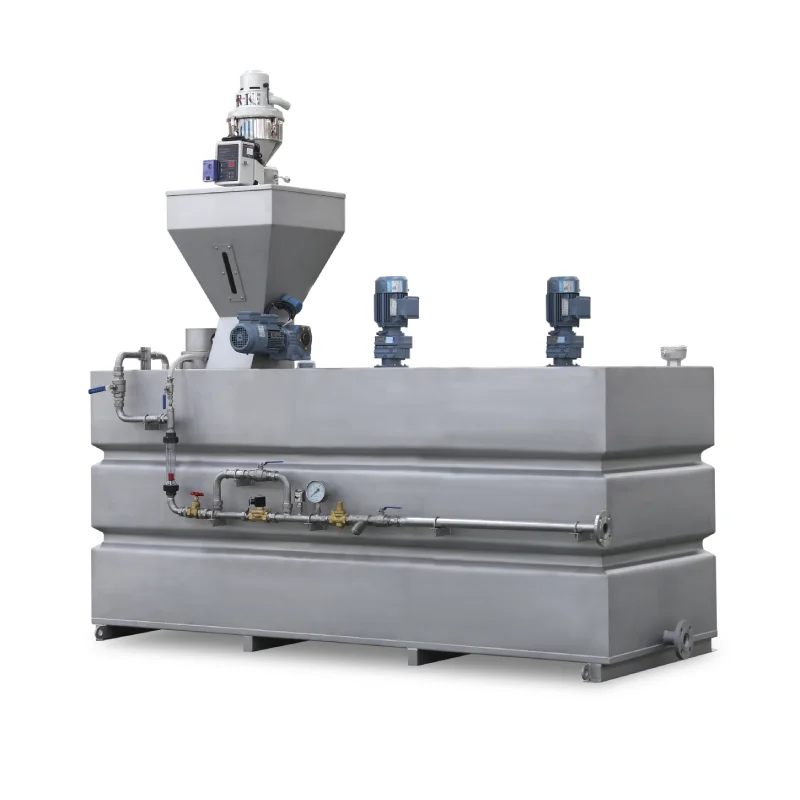
Automatic Dosing Machine
1.Three-Compartment Fully Automatic Dosing Machine: Primarily designed for continuous dosing applications in thickeners and concentrators.
2.Two-Compartment Fully Automatic Dosing Machine: Primarily used for conditioning tanks, suitable for intermittent dosing and handling large instantaneous dosages.
We offer product customization services to meet your specific needs.

What is an automatic dosing machine?
An automatic dosing machine is a sophisticated device designed for water treatment and various industrial processes. It precisely and continuously adds chemicals (such as coagulants, disinfectants, pH adjusters, etc.) to fluids, typically water, as needed. The purpose of this equipment is to ensure the efficient operation of water treatment systems and to maintain water quality standards, such as pollutant removal, corrosion prevention, disinfection, or water softening.

Advantages of Jingjin Automatic Dosing Machines Compared to Other Manufacturers:
1.All three compartments are equipped with agitators, ensuring longer and more complete dissolution of agents. In contrast, some manufacturers only provide agitation in the first two compartments.
2.A low-temperature heating device and moisture-proof cover are included in the dry powder storage hopper to prevent moisture absorption and maintain agent effectiveness. Some manufacturers lack these features.
3.Some manufacturers do not include agitators in their storage tanks, leading to poor dissolution of flocculants. This often results in on-site workers having to remove undissolved flocculants to prevent pipe and pump blockages, causing waste.
Application Areas of Automatic Dosing Machines:
1.Sewage Treatment: Automatic dosing machines are crucial in sewage treatment, automatically and accurately adding flocculants, coagulants, disinfectants, and other chemicals to enhance treatment efficiency and effectiveness.
2.Industrial Circulating Water Treatment: In these systems, dosing machines add scale inhibitors, corrosion inhibitors, biocides, and other agents to prevent scaling, corrosion, and microbial growth, ensuring system integrity.
3.Boiler Water Treatment: Used to prevent scaling and corrosion in boilers by adding deoxidizers, phosphates, and alkaline agents, thus improving boiler efficiency and safety.
4.Drinking Water Treatment: Dosing machines add disinfectants (like chlorine, chlorine dioxide), pH adjusters, and coagulants to ensure the safety and hygiene of drinking water.
5.Swimming Pools and Waterscape Facilities: They maintain clean and safe water by adding disinfectants, pH adjusters, and clarifiers.
6.Metallurgical Industry: Used to add treatment agents that enhance separation efficiency and metal recovery during ore flotation, smelting, and refining.
7.Chemical Industry: Dosing machines add catalysts, stabilizers, and pH adjusters during production to ensure reaction stability and product quality control.
8.Pulp and Paper Industry: They add chemicals such as bleaching agents, pulp enhancers, and defoamers to improve pulp quality, production efficiency, and reduce pollution.
Why Choose Automatic Dosing Machine
1.High precision: Automatic dosing machines can achieve high-precision dosing of drugs, ensuring accurate dosage of drugs, which is essential for many industrial processes and laboratory experiments.
2.Automated operation: Automatic dosing machines reduce the need for manual operation through advanced control systems, improve production efficiency and ease of operation.
3.Reduce manual errors: The automated dosing process reduces errors caused by human factors and improves the reliability and repeatability of the entire system.
4.Easy to monitor and control: Many automatic dosing machines are equipped with user-friendly interfaces and control systems, which make it easy for operators to monitor and adjust the dosing process.
5.Adaptable: Automatic dosing machines can adapt to different application requirements, including different drug types, concentrations and dosing rates.
6.Easy maintenance: Compared with traditional dosing equipment, automatic dosing machines are generally designed to be more durable and easy to maintain, reducing long-term operating costs.
Application areas of automatic dosing machines
1. Sewage treatment: The automatic dosing machine plays a key role in the sewage treatment process. It can automatically and accurately add flocculants, coagulants, disinfectants and other chemical agents to sewage to improve the efficiency and effect of sewage treatment.
2. Industrial circulating water treatment: In industrial circulating water systems, automatic dosing machines are used to add scale inhibitors, corrosion inhibitors, biocides and other agents to prevent scaling, corrosion and microbial growth of water pipes and equipment, and ensure the normal operation of the system.
3. Boiler water treatment: The automatic dosing machine is used in boiler water treatment systems to prevent scaling and corrosion in the boiler by adding deoxidizers, phosphates, alkaline agents, etc., and improve boiler operation efficiency and safety.
4. Drinking water treatment: In the process of drinking water treatment, automatic dosing machines are used to add disinfectants (such as chlorine, chlorine dioxide), pH adjusters, coagulants, etc. to ensure the safety and hygiene of drinking water.
5. Swimming pools and waterscape facilities: Automatic dosing machines are used in swimming pools and waterscape facilities to add disinfectants, pH adjusters and clarifiers to keep the water clean and safe.
6. Metallurgical industry: In the metallurgical industry, automatic dosing machines are used to add various treatment agents to improve the separation efficiency and metal recovery rate during ore flotation, smelting and refining.
7. Chemical industry: The chemical industry uses automatic dosing machines to add catalysts, stabilizers, pH adjusters, etc. during the production process to ensure the stability of chemical reactions and the control of product quality.
8. Pulp and paper industry: In the pulp and paper industry, automatic dosing machines are used to add chemicals such as bleaching agents, pulp enhancers, defoamers, etc. to improve pulp quality and production efficiency and reduce pollution during the production process.
If you are interested in our products, please contact us !
